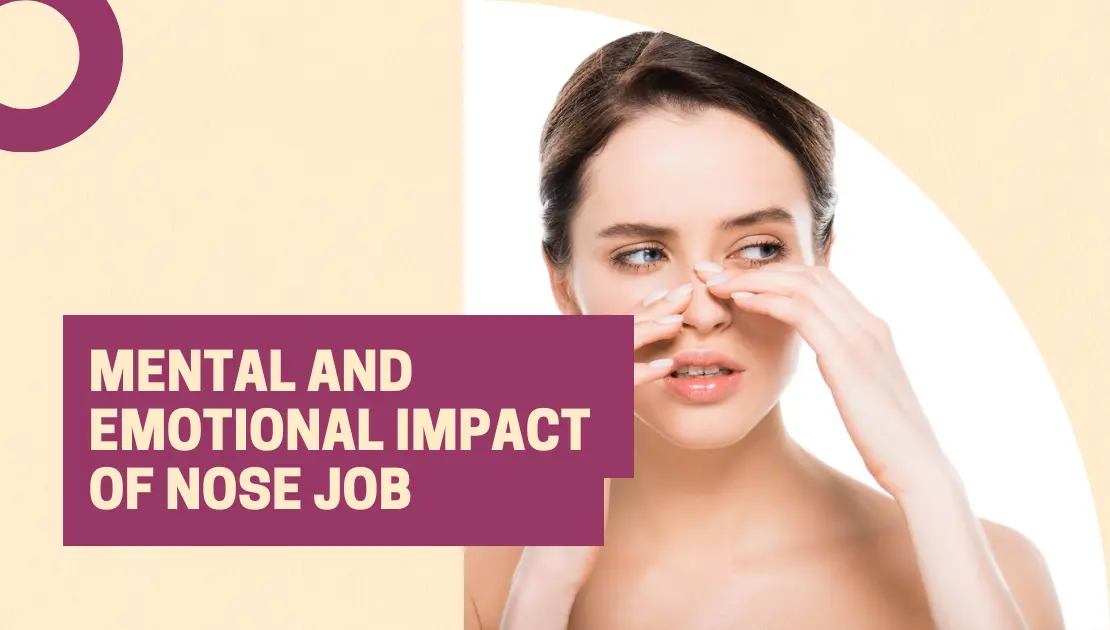Table Of Content
- Introduction
- The Psychological Impact of Rhinoplasty
- 1. Confidence Boost: Embracing a New You
- 2. Emotional Vulnerability During Recovery
- 3. Shifting Perceptions of Self
- 4. Psychological Challenges and Mental Health Awareness
- 5. The Role of a Reliable Surgeon
- Frequently Asked Questions
- Conclusion
Introduction
Emotional impact of rhinoplasty is profound and can positively affect the way you think and feel.
Many individuals see the nose job as a life altering procedure. Because, nose surgery can enhance self-esteem and self-image leaving you feeling just and empowered. They start experiencing an increased feeling of confidence each passing day.
Like any significant life change, nose job comes with multiple psychological impacts that vary from person to person.
A study by The Eurasian Journal of Medicine stated, ‘setting realistic nose job outcomes before surgery allowed patients and surgeons to experience a rewarding procedure’.
The Psychological Impact of Rhinoplasty
Understanding the emotional effects of rhinoplasty is crucial for a well-rounded experience. While the physical transformation is visible, the emotional shifts can be equally profound.
1. Confidence Boost: Embracing a New You
One of the primary reasons people choose rhinoplasty is dissatisfaction with their nose’s appearance. This often stems from childhood teasing, societal beauty standards, or personal insecurities.
A well-executed nose job by an experienced surgeon can lead to a significant improvement in self-image:
- Increased social comfort: Patients report feeling more at ease in social settings.
- Photo confidence: Many start taking more selfies and photos without anxiety.
- Improved physical health: Better breathing and reduced stress contribute to overall well-being.
Real Patient Experiences
At Allure Medspa, many former patients share that they feel empowered, comfortable in their skin, and ready to face the world with renewed confidence.
2. Emotional Vulnerability During Recovery
Rhinoplasty recovery comes with physical and emotional challenges. Swelling, bruising, and facial changes in the initial weeks can trigger anxiety and doubt.
Common emotional phases:
- Weeks 1–3: Anxiety over swelling and temporary changes.
- Months 3–6: Gradual acceptance as improvements become visible.
- Months 8–12: Emotional relief as the final results settle.
It’s normal to have moments of regret or worry, but patience and resilience are key.
Tip: Lean on loved ones for support and communicate openly with your surgeon.
3. Shifting Perceptions of Self
A new nose can reshape your self-image and alter how others perceive you. This shift may bring an emotional adjustment period:
- Positive outcomes: A harmonious alignment with your ideal self-image.
- Emotional adjustment: It may take time to mentally integrate your new look.
Setting realistic expectations helps ease this transition and fosters self-acceptance.
4. Psychological Challenges and Mental Health Awareness
For individuals with Body Dysmorphic Disorder (BDD) or perfectionist tendencies, rhinoplasty can present unique challenges. Unrealistic expectations or continued fixation on imperfections may lead to dissatisfaction.
- Pre- and post-surgical counseling can be invaluable.
- Mental health support ensures emotional well-being throughout the journey.
5. The Role of a Reliable Surgeon
Choosing an empathetic, experienced surgeon is crucial for a successful emotional and physical outcome.
A trustworthy surgeon will:
- Set realistic expectations: Explain achievable results.
- Offer guidance: Provide emotional support through counseling.
- Customize procedures: Tailor surgery to align with your goals.
With the right surgeon, you can achieve a balanced, natural-looking nose that enhances your facial harmony and boosts long-term confidence.
Frequently Asked Questions
Q1. Does rhinoplasty cause depression?
Ans. Rhinoplasty itself doesn’t cause depression, but unrealistic expectations or dissatisfaction with results may lead to emotional distress. Counseling can help.
Q2. What are rhinoplasty satisfaction rates?
Ans. Rhinoplasty satisfaction rates 95% to 98% at Allure Medspa.
Q3. Can a nose job boost confidence?
Ans. Yes, a nose job can significantly boost confidence by enhancing facial harmony and addressing concerns about nasal appearance.
Q4. How does rhinoplasty affect mental health?
Ans. Rhinoplasty can improve mental health by addressing self-esteem issues. Some of our patients also experienced temporary emotional ups and downs during recovery.
Q5. What is emotional recovery post nose job?
Ans. Emotional recovery involves adjusting to changes in appearance, which may include initial anxiety or uncertainty. These aspects improve as healing progresses.
Conclusion
Rhinoplasty is not just a physical transformation — it’s an emotional journey. By understanding the psychological aspects, preparing mentally, and choosing the right surgeon, you can experience a positive, life-enhancing change.
With patience, realistic expectations, and support, your rhinoplasty experience can empower you to embrace your new appearance and step into life with renewed confidence.












